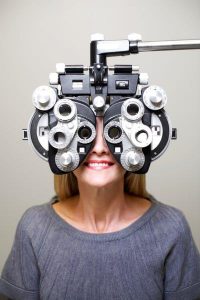How often you should get your eyes tested and other eye health advice

Your eyes are the most sensitive organ in your body, are used in almost every daily application and need lots of love and attention.
So what should you be doing to keep up optimum eye health? This guide will show you all the steps you need to ensure your peepers are keepers.
Have your eyes regularly checked
Most experts recommend that you should have your eyes assessed once every one to two years, but there are many factors that should be considered when you are thinking of booking your next appointment.
Age is an important factor, and those over the age of 40 should be guided by their optometrist on how often they should book in checks. Likewise, other medical conditions like diabetes can translate to eye complications, so consult your GP if you have pre-existing circumstances such as these.
There are a raft of symptoms you should not ignore. If you experience any of these, book a test as soon as you can:
- Eye strain and headaches
- Dry, red or itchy eyes
- Blurred vision
- Seeing halos
- Difficulty reading
- Noticeable change in near or distance vision.
Have a comprehensive dilated eye exam
While regular exams are strongly advisable, they can only offer so much insight into the condition of your eyes.
This is why it is important to have a comprehensive dilated eye exam, preferably once a year. Eyedrops are used to dilate the pupil and give the eye practitioner a better look at the entire retina.
This process can be slightly uncomfortable, as more light is let into the eyes. Bring your sunglasses, organise a lift home afterwards and your eyes will return to normal within four hours.
Eat right and maintain a healthy weight
We live in a world where the benefits of eating healthy, fresh foods is not shocking news for most of us.
And not surprisingly, keeping up these good habits also translates to better eye health. Some conditions which can be halted or even stopped include: macular degeneration, diabetes, cataracts, retinitis pigmentosa and retinal vein occlusion.
Fruit, vegetables, nuts, eggs, red meat, vegetable oils and shellfish are all top tickets to good eye health.
Conversely, eating poorly can lead to obesity—something that can also have an effect on your vision Additionally, cardiovascular disease and diabetes are both directly linked to obesity, with vision loss a side effect of these diseases.
High blood pressure and cholesterol are also key triggers for vision degeneration.
Ditch the cigarettes, or better yet, don’t start smoking in the first place
Age-related macular degeneration is the most common cause of blindness in the western world, and smoking accelerates this process.
Smoking causes cholesterol and fat to build up in arteries, and the eyes are built on fine networks of blood vessels.
These blockages can lead to gradual loss of vision and scarring of the retina. None of the complications are reversible, so it is best to flick the cigarettes before they take hold.
Get to know family history
Like most diseases, many forms of eye disease are hereditary.
Speak to your family members about their knowledge of eye disease that may run in the family. This can allow specialists to adopt early preventative measures.
Wear your sunnies and protective gear
Sunglasses are an effective tool in combating cataracts, macular degeneration and pterygium (tissue growth on the eye). However, it is important you wear the right ones.Those $10 specials from the Sunday markets are great for the hip-pocket, but they may not be offering you much in the way of protection. Instead, look for glasses with high UV ratings for 100% filtration to ensure the harmful rays aren’t piercing the lenses and doing damage to your eyes.
Also ensure you are wearing protective wear for all activities that require them, like welding, swimming and sporting activities where your eyes could be placed at risk.
Practice workplace safety, whether you are inside or out
The use of protective devices is crucial on the job, especially when you are outdoors or operating machinery.
But just because you work in an office doesn’t mean you don’t have to worry about looking after your eyes.
The Optometrists Association Australia (OAA) has advised that deterioration of eye health from computer use is becoming more common in the modern age.
Some things you can do to help include:
- Ensure you take regular breaks
- Avert your gaze on the monitor every couple of minutes
- Ensure lighting is even and without glare
- Adjust your monitor so the top is level with your eyes
NewVision Clinics has experienced professionals on hand to guide you through proper eye care and answer any questions you may have.
For more information, give NewVision a call on 1800 202 020. Alternatively, head to the online booking form to lock in a no-obligation consultation.
——————————————————————————————-
Byline
Josh Alston
editorial@artofwritingpr.com.au
A former news hound, editor and roaming reporter for News Corp Australia for 12 years, Josh is now a freelance copywriter covering politics, innovation, technology, health, science and financial services, among other topics.
